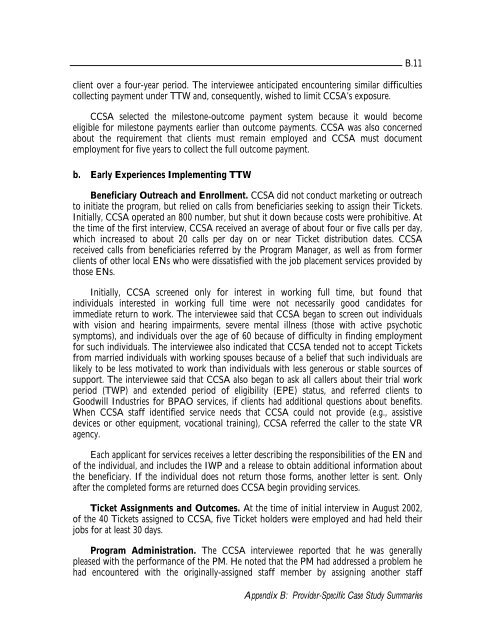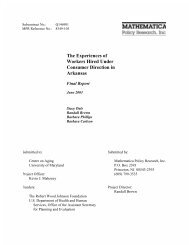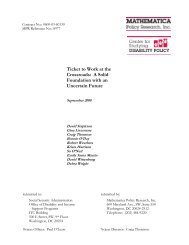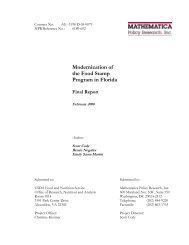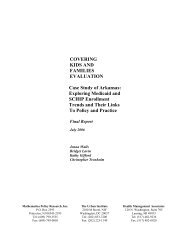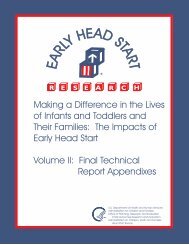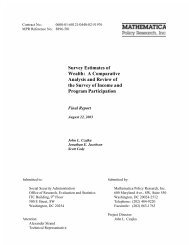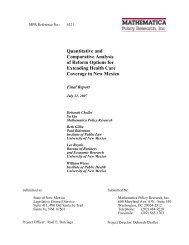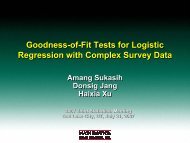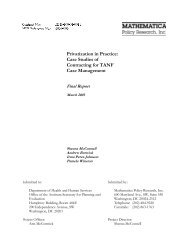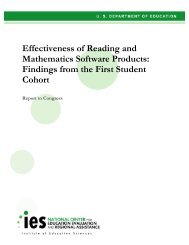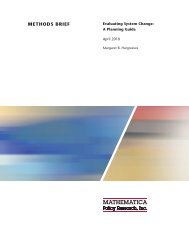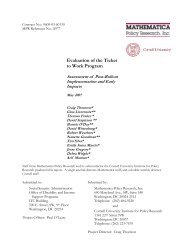Evaluation of the Ticket to Work Program Initial Evaluation Report
Evaluation of the Ticket to Work Program Initial Evaluation Report
Evaluation of the Ticket to Work Program Initial Evaluation Report
You also want an ePaper? Increase the reach of your titles
YUMPU automatically turns print PDFs into web optimized ePapers that Google loves.
B.11<br />
client over a four-year period. The interviewee anticipated encountering similar difficulties<br />
collecting payment under TTW and, consequently, wished <strong>to</strong> limit CCSA’s exposure.<br />
CCSA selected <strong>the</strong> miles<strong>to</strong>ne-outcome payment system because it would become<br />
eligible for miles<strong>to</strong>ne payments earlier than outcome payments. CCSA was also concerned<br />
about <strong>the</strong> requirement that clients must remain employed and CCSA must document<br />
employment for five years <strong>to</strong> collect <strong>the</strong> full outcome payment.<br />
b. Early Experiences Implementing TTW<br />
Beneficiary Outreach and Enrollment. CCSA did not conduct marketing or outreach<br />
<strong>to</strong> initiate <strong>the</strong> program, but relied on calls from beneficiaries seeking <strong>to</strong> assign <strong>the</strong>ir <strong>Ticket</strong>s.<br />
<strong>Initial</strong>ly, CCSA operated an 800 number, but shut it down because costs were prohibitive. At<br />
<strong>the</strong> time <strong>of</strong> <strong>the</strong> first interview, CCSA received an average <strong>of</strong> about four or five calls per day,<br />
which increased <strong>to</strong> about 20 calls per day on or near <strong>Ticket</strong> distribution dates. CCSA<br />
received calls from beneficiaries referred by <strong>the</strong> <strong>Program</strong> Manager, as well as from former<br />
clients <strong>of</strong> o<strong>the</strong>r local ENs who were dissatisfied with <strong>the</strong> job placement services provided by<br />
those ENs.<br />
<strong>Initial</strong>ly, CCSA screened only for interest in working full time, but found that<br />
individuals interested in working full time were not necessarily good candidates for<br />
immediate return <strong>to</strong> work. The interviewee said that CCSA began <strong>to</strong> screen out individuals<br />
with vision and hearing impairments, severe mental illness (those with active psychotic<br />
symp<strong>to</strong>ms), and individuals over <strong>the</strong> age <strong>of</strong> 60 because <strong>of</strong> difficulty in finding employment<br />
for such individuals. The interviewee also indicated that CCSA tended not <strong>to</strong> accept <strong>Ticket</strong>s<br />
from married individuals with working spouses because <strong>of</strong> a belief that such individuals are<br />
likely <strong>to</strong> be less motivated <strong>to</strong> work than individuals with less generous or stable sources <strong>of</strong><br />
support. The interviewee said that CCSA also began <strong>to</strong> ask all callers about <strong>the</strong>ir trial work<br />
period (TWP) and extended period <strong>of</strong> eligibility (EPE) status, and referred clients <strong>to</strong><br />
Goodwill Industries for BPAO services, if clients had additional questions about benefits.<br />
When CCSA staff identified service needs that CCSA could not provide (e.g., assistive<br />
devices or o<strong>the</strong>r equipment, vocational training), CCSA referred <strong>the</strong> caller <strong>to</strong> <strong>the</strong> state VR<br />
agency.<br />
Each applicant for services receives a letter describing <strong>the</strong> responsibilities <strong>of</strong> <strong>the</strong> EN and<br />
<strong>of</strong> <strong>the</strong> individual, and includes <strong>the</strong> IWP and a release <strong>to</strong> obtain additional information about<br />
<strong>the</strong> beneficiary. If <strong>the</strong> individual does not return those forms, ano<strong>the</strong>r letter is sent. Only<br />
after <strong>the</strong> completed forms are returned does CCSA begin providing services.<br />
<strong>Ticket</strong> Assignments and Outcomes. At <strong>the</strong> time <strong>of</strong> initial interview in August 2002,<br />
<strong>of</strong> <strong>the</strong> 40 <strong>Ticket</strong>s assigned <strong>to</strong> CCSA, five <strong>Ticket</strong> holders were employed and had held <strong>the</strong>ir<br />
jobs for at least 30 days.<br />
<strong>Program</strong> Administration. The CCSA interviewee reported that he was generally<br />
pleased with <strong>the</strong> performance <strong>of</strong> <strong>the</strong> PM. He noted that <strong>the</strong> PM had addressed a problem he<br />
had encountered with <strong>the</strong> originally-assigned staff member by assigning ano<strong>the</strong>r staff<br />
Appendix B: Provider-Specific Case Study Summaries


